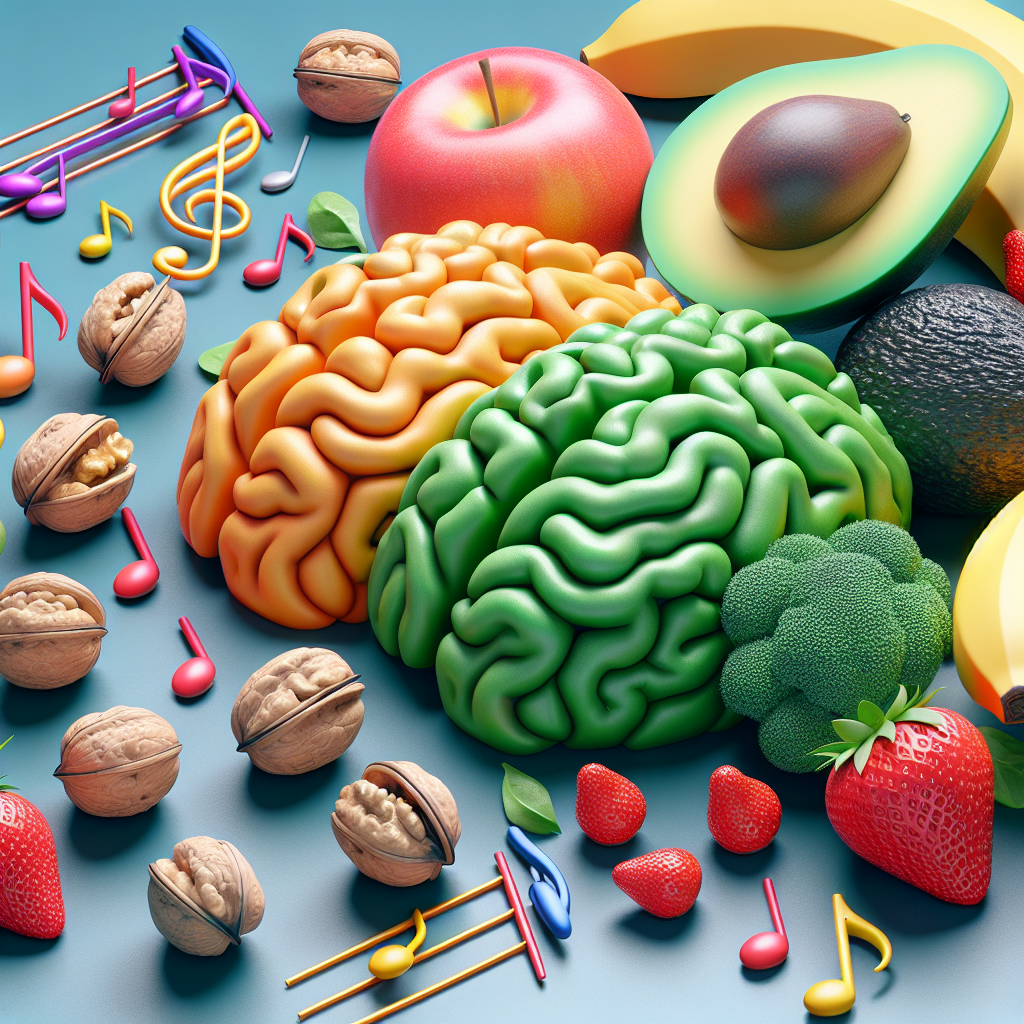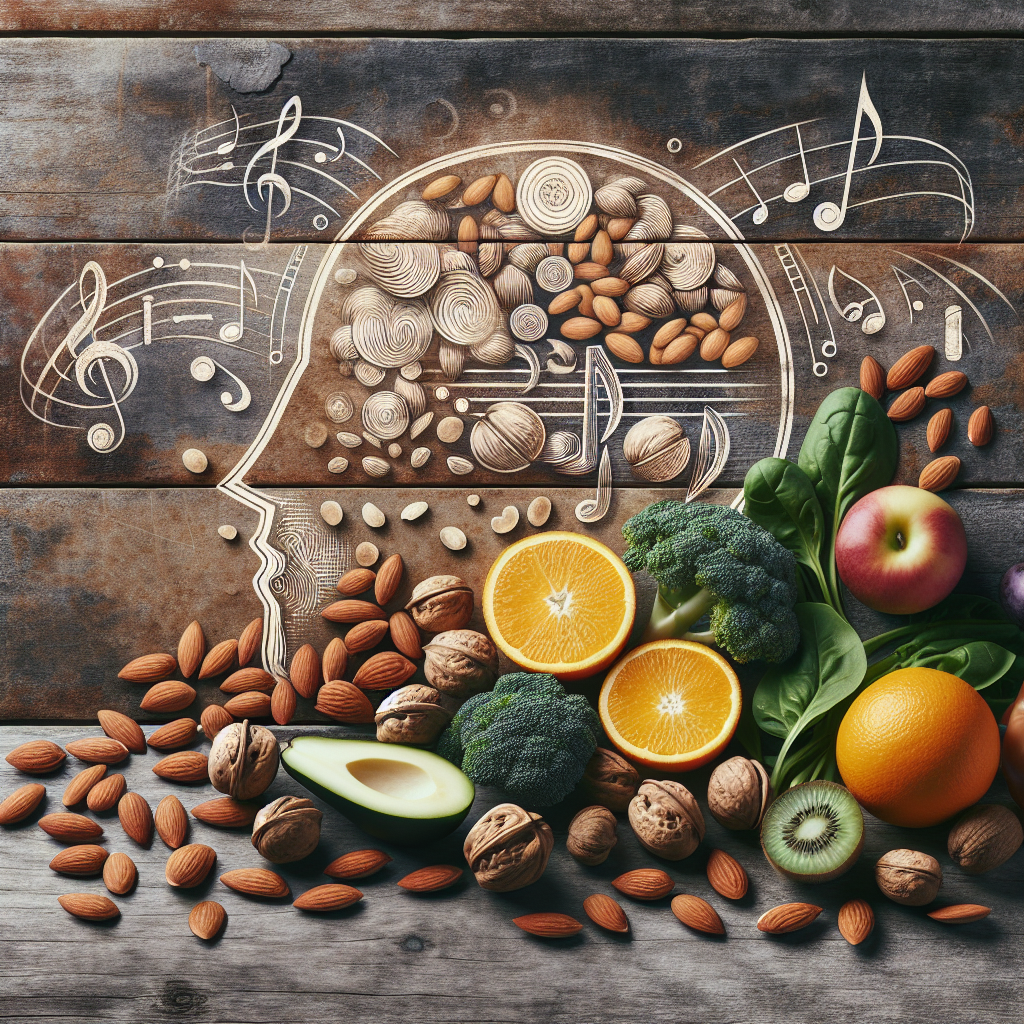Natural Vitamins that Support Mental Health for Musicians

Boost your mental health with our natural vitamins specially designed for musicians. Improve your focus, creativity, and overall well-being. Don’t wait, start your journey to a healthier mind today! Click here to learn more.
Exploring the Role of Natural Vitamins in Enhancing Musicians’ Mental Health
The life of a musician, while often glamorized, can be fraught with unique challenges that can take a toll on mental health. The pressure to consistently produce high-quality music, coupled with the irregular schedules and the public scrutiny, can lead to stress, anxiety, and even depression. In this context, it becomes crucial to explore the role of natural vitamins in enhancing musicians’ mental health.
Vitamins, as we know, are essential nutrients that our bodies need to function properly. They play a critical role in maintaining our physical health, but their impact extends beyond that. Recent research has shown that certain vitamins can also support mental health, helping to alleviate symptoms of stress, anxiety, and depression. For musicians, who often face high levels of these mental health challenges, incorporating these vitamins into their diet can be a game-changer.
One such vitamin is B-complex, a group of eight vitamins that includes B1, B2, B3, B5, B6, B7, B9, and B12. These vitamins are known for their role in maintaining healthy brain function and producing mood-regulating chemicals like serotonin. A deficiency in any of these vitamins can lead to mood disorders, including depression and anxiety. Therefore, musicians can benefit from a diet rich in B-complex vitamins, which can be found in foods like whole grains, beans, peas, and lentils, and leafy greens.
Vitamin D, often referred to as the “sunshine vitamin,” is another essential nutrient that can support mental health. It is produced by the body in response to sunlight and can also be obtained from certain foods like fatty fish and fortified dairy products. Research has linked Vitamin D deficiency to depression, particularly seasonal affective disorder, which can affect musicians who spend long hours indoors for practice or recording. Regular exposure to sunlight, along with a diet rich in Vitamin D, can help maintain healthy mood levels.
Omega-3 fatty acids, while not technically a vitamin, are worth mentioning for their significant role in brain health. These essential fats are crucial for maintaining the structure and function of the brain and have been linked to reduced symptoms of depression and anxiety. Foods rich in Omega-3s, such as fatty fish, walnuts, and flaxseeds, can be a valuable addition to a musician’s diet.
Lastly, we have Magnesium, a mineral that plays a vital role in the brain functions that regulate mood. Magnesium deficiency has been linked to an increased risk of depression. Foods rich in magnesium include nuts, seeds, whole grains, and leafy green vegetables.
In conclusion, while the life of a musician can be mentally challenging, natural vitamins can offer a supportive role in maintaining mental health. A balanced diet rich in B-complex vitamins, Vitamin D, Omega-3 fatty acids, and Magnesium can help manage stress, anxiety, and depression. However, it’s important to remember that while these vitamins can support mental health, they are not a substitute for professional mental health services. Musicians facing mental health challenges should seek help from a mental health professional. Incorporating these vitamins into a balanced diet can be part of a comprehensive approach to mental health care for musicians.
The Impact of Natural Vitamins on Stress Management for Musicians

Musicians, like any other professionals, face a myriad of challenges that can take a toll on their mental health. The pressure to create, perform, and please their audience can be overwhelming, leading to stress, anxiety, and even depression. However, the good news is that there are natural vitamins that can help musicians manage these mental health issues effectively.
Vitamins play a crucial role in maintaining our overall health, including mental health. They are essential for the proper functioning of the brain and nervous system, and a deficiency can lead to various mental health issues. For musicians, who often lead a hectic lifestyle, ensuring an adequate intake of these vitamins can help manage stress and improve their mental well-being.
One of the most important vitamins for mental health is Vitamin B. The B-vitamins, particularly B6, B9, and B12, are known for their role in producing brain chemicals that affect mood and other brain functions. A deficiency in these vitamins can lead to depression and anxiety. Therefore, musicians should consider incorporating foods rich in B-vitamins, such as whole grains, meat, eggs, and dairy products, into their diet. Alternatively, they can take B-vitamin supplements to ensure they are getting enough of these essential nutrients.
Vitamin D is another essential vitamin for mental health. It is often referred to as the “sunshine vitamin” because our bodies produce it when exposed to sunlight. Research has shown that Vitamin D deficiency is associated with an increased risk of depression. Musicians, especially those who spend most of their time indoors, may not get enough sunlight, leading to a deficiency in this vitamin. Therefore, it is important for them to take Vitamin D supplements or eat foods rich in this vitamin, such as fatty fish and fortified dairy products.
Omega-3 fatty acids, although not a vitamin, are worth mentioning due to their significant impact on mental health. They are essential fats that play a crucial role in brain function and development. Studies have shown that they can help reduce symptoms of depression and anxiety. Musicians can get Omega-3 fatty acids from foods like fish, flaxseeds, and walnuts, or from supplements.
Magnesium is another nutrient that is essential for mental health. It helps regulate the nervous system and can help manage stress and anxiety. Musicians can get magnesium from foods like nuts, seeds, and green leafy vegetables, or from supplements.
In conclusion, musicians, like everyone else, need to take care of their mental health. The pressures and demands of their profession can lead to stress, anxiety, and depression if not managed properly. Fortunately, there are natural vitamins that can help them manage these mental health issues. By ensuring an adequate intake of vitamins B, D, Omega-3 fatty acids, and magnesium, musicians can improve their mental well-being and continue to create and perform at their best. However, it is important to remember that while these vitamins can help manage mental health issues, they are not a substitute for professional help. If a musician is struggling with mental health issues, they should seek help from a mental health professional.
Natural Vitamins: A Key to Improved Focus and Creativity in Musicians
Musicians, like any other professionals, require a healthy mind to perform at their best. The mental demands of composing, performing, and even practicing music can be quite taxing. It is therefore essential for musicians to maintain their mental health, and one effective way to do this is through the intake of natural vitamins. These vitamins not only support overall health but also play a significant role in enhancing focus and creativity, two crucial elements in the life of a musician.
Firstly, let’s delve into the importance of B vitamins. These vitamins, particularly B6, B9, and B12, are known for their role in brain health. They aid in the production of brain chemicals that affect mood and other brain functions. Low levels of these vitamins, especially B12, can lead to depression and confusion, hindering a musician’s ability to focus and create. Therefore, incorporating foods rich in B vitamins, such as whole grains, meat, eggs, and dairy products, into a musician’s diet can significantly improve their mental health.
Next, we turn our attention to Omega-3 fatty acids. While not technically a vitamin, these fatty acids are vital nutrients that contribute to brain health. They are known to improve cognitive function and mood, both of which are essential for musicians. Omega-3 fatty acids can be found in fatty fish, flaxseeds, and walnuts. Regular consumption of these foods can help musicians maintain a healthy mind, thereby enhancing their focus and creativity.
Vitamin D is another essential nutrient that supports mental health. It is often referred to as the “sunshine vitamin” because it is produced in the skin in response to sunlight. Vitamin D is known to promote brain health by supporting the growth of nerve cells. It also plays a role in mood regulation, with deficiencies linked to depression and mood swings. For musicians, maintaining adequate levels of Vitamin D can help improve their mental well-being, thereby enhancing their ability to focus and create music.
Antioxidants, such as Vitamin C and E, also play a crucial role in supporting mental health. They help protect the brain from oxidative stress, a damaging process that can lead to cognitive decline. By including antioxidant-rich foods like citrus fruits, berries, nuts, and spinach in their diet, musicians can help safeguard their mental health, promoting better focus and creativity.
Lastly, let’s not forget about minerals like magnesium and zinc. Magnesium is known to support brain function and mood regulation, while zinc plays a crucial role in nerve signaling. Their deficiency can lead to a variety of mental health issues, including anxiety and depression. Therefore, musicians should ensure they consume enough magnesium and zinc-rich foods like legumes, whole grains, and oysters to support their mental health.
In conclusion, maintaining mental health is crucial for musicians to perform at their best. Natural vitamins and other nutrients play a significant role in supporting mental health, enhancing focus and creativity. By incorporating foods rich in these nutrients into their diet, musicians can not only improve their mental health but also their overall performance. However, it’s important to remember that while these vitamins can support mental health, they are not a cure for mental health disorders. If you’re a musician struggling with mental health issues, it’s crucial to seek professional help.